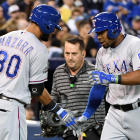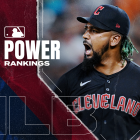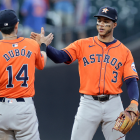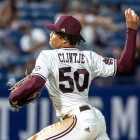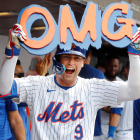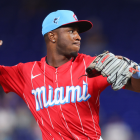The Texas Rangers, 5-9 and last in the American League West, are not where they wanted to be nearing May.
Injured closer Sam Dyson has served as the face of Texas' slow start, with his inability to preserve leads providing an easy narrative to explain the shoddy record. But Dyson's struggles, though impactful, have obscured another culprit -- a largely disappointing lineup.
That seems like an absurd comment given the Rangers rank third in the majors in home runs and fourth in runs scored. Yet look closer and the issues come into focus. The Rangers entered Wednesday ranked 14th in the American League in batting average and 12th in on-base percentage. Advanced statistics like wRC+ (a fancy-pants metric that attempts to properly weigh offensive events) also paint the Rangers (ranked 22nd) as a below-average offense -- one being propped up by its ballpark, its home runs, and two of its players.

While there's no statistic for lineup equality, it's hard to ignore how lopsided Texas' starting nine has been thus far. The Rangers have essentially been putting all the pressure on Nomar Mazara and Elvis Andrus, both of whom are off to great starts: Mazara is hitting .328/.371/.586 with more home runs (four) than strikeouts (three); Andrus is hitting nearly as well, at .321/.345/.589. The rest of the Rangers have been horrible, with just one of the other seven with more than 20 plate appearances boasting an OPS+ north of 90. Meanwhile, three of those Rangers (Jonathan Lucroy and Mike Napoli included) have OPS+ of 50 or worse.
Put another way, the Rangers' team line goes from .217/.290/.397 to .183/.270/.332 when Mazara and Andrus are excluded -- that 85-point swing in OPS is the difference between ranking 20th and ranking 30th. Obviously taking away the best hitters on any team will make its numbers markedly worse, but the Rangers represent an extreme example.
If there's good news for the Rangers, it's that Lucroy, Napoli, and company probably didn't forget how to hit over the winter -- even if the results suggest otherwise. So, in all likelihood, the Rangers are going to start hitting better. How much better is the question, given the reason for reservation about many of the other Texas hitters, including Joey Gallo, Jurickson Profar, and Carlos Gomez -- each of whom has outstanding questions about their offensive potential.
The takeaway here, then, is this: the Rangers' early-season struggles are more widespread -- and, frankly, more concerning -- than the Dyson-centered headlines suggest.









